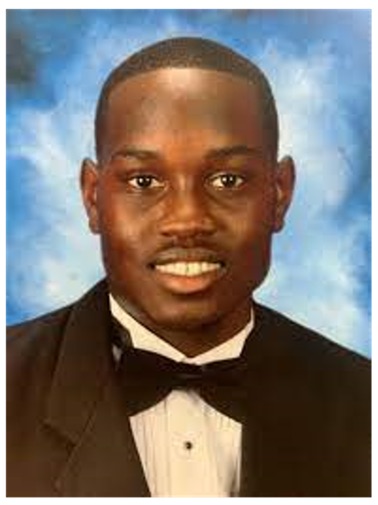All three defendants, Gregory McMichael, Travis McMichael and William Bryan Jr., have been found guilty in the Ahmaud Arbery trial following deliberations that ended the afternoon of Wednesday, November 24.
The jury recessed for the evening at the end of the day on Tuesday, November 23, after telling the judge that they were still negotiating and preferred to stop for the day.
Late Monday. November 22, defense attorney Laura Hogue, in her closing arguments, said, “Turning Ahmaud Arbery into a victim after the choices that he made does not reflect the reality of what brought Ahmaud Arbery to Satilla Shores in his khaki shorts with no socks to cover his long, dirty toenails.”
Arbery’s mother, Wanda Cooper-Jones, immediately left the courtroom after Hogue’s remark. She later told CNN, “I thought it was very, very rude to talk about his long, dirty toenails and to totally neglect that my son had a huge hole in his chest when he was shot with that shotgun.”
During the course of the trial, lead prosecutor Linda Dunikoski said the three white men who killed Ahmaud Arbery last year initiated their encounter with the Black jogger and cannot claim they shot him in self-defense.
Dunikoski made that statement in her closing arguments in the trial that has rocked Brunswick, Georgia, in the past two weeks. The proceedings have been closely watched by Black clergy and civil rights activists across the country. Black Lives Matter protestors rallied outside the Glynn County Courthouse in support of Arbery’s family.
Gregory and Travis McMichael and William Bryan face nine criminal counts, including felony murder, aggravated assault and false imprisonment. The three white men are accused of using their pickup trucks to chase and assault Arbery before killing him with a 12-gauge shotgun.
Before a nearly all-white jury, Duni- koski suggested the defendants had little reason to believe Arbery had committed a crime before they initiated what they claimed was a citizen’s arrest under Georgia law. The men’s defense lawyers have stated that their clients suspected Arbery after recent thefts in the neighborhood, though there has been no evidence presented that he stole anything.
“All three of these defendants made assumptions, made assumptions about what was going on that day,” Dunikoski said. “And they made their decision to attack Ahmaud Arbery in their driveways, because he was a Black man running down the street.”
Several times during her closing arguments, Dunikoski urged the jurors to use their “common sense,” as she predicted that defense attorneys in their closing arguments would characterize Arbery as the aggressor and say the three defendants were merely defending themselves.
Dunikoski noted that Arbery was unarmed during the encounter and tried to flee the men before he was killed. “He ran away from them for five minutes,” Dunikoski said. “No weapon. No threats. No way to call for help. Didn’t even have a cell phone on him. Ran away from them for five minutes.”
Meanwhile, Jason Sheffield, the defense attorney for Travis McMichael, said in his closing arguments that his client was within his rights to shoot and kill Arbery during the fight.
Sheffield said McMichael didn’t intend to kill Arbery that day but did so in self-defense after believing he was in danger. “You are allowed to defend yourself. You are allowed to use force that is likely to cause death or serious bodily injury if you believe it’s necessary,” Sheffield said. “At that moment Travis believed it was necessary. This is a law that is for a person in Travis’ situation.”
Sheffield said Satilla Shores, the neighborhood where Arbery was kill- ed, was “once idyllic” but started to change as neighbors reported break-ins and other suspicious behavior, he said. Sheffield said McMichael had even encountered Arbery in the neighborhood once before in a meeting that left McMichael shaken.
Sheffield said with this knowledge, his client, along with his father, Greg, grabbed their guns, hopped in McMichael’s truck and went after Arbery after he was seen in the neighborhood on February 23.
Sheffield said McMichael had a right to detain Arbery until the police arrived because he suspected Arbery had committed a crime. “I think that if you’ve heard anything that I’ve said, there’s only one decision,” Sheffield said. “He is not guilty on all charges.”
In his closing arguments, Kevin Gough, William “Roddie” Bryan’s attorney, said his client did not in any way contribute to Arbery’s death. He said Arbery would likely be dead even if Bryan had not joined the McMichaels in their pursuit.
“Roddie Bryan’s presence is absolutely superfluous and irrelevant to the tragic death of Ahmaud Arbery,” Gough said. “Had Roddie Bryan stayed in bed that day, if Roddie Bryan stayed on his front porch, would Ahmaud Arbery be alive today?” he asked.
Gough then said, “If the theory is that these men were vigilantes and harbored some ill will toward Mr. Arbery,” he said, referring to the McMichaels, “then what difference does it make whether Roddie Bryan was there or not?”
Gough said Bryan kept to himself and didn’t really know any of his neighbors. “He is not an attention seeker. He is an ordinary guy,” he said. “He is not a vigilante.”
Gough said on that day, it was impossible for Bryan to know that the McMichaels were carrying weapons. Gough also reminded jurors of Bryan’s cooperation with the police on the day of the killing and throughout the subsequent investigation. He also said Bryan returned to the scene after the McMic- haels had cornered Arbery.
“Call it divine providence,” he said, “but something is guiding Mr. Bryan down this street to document what is going on.”






